The Netherlands and Germany house some of the world’s most prominent universities. As a result, it is understandable why so many international students decide to pursue their higher education in these nations. Both countries provide world-class education and career opportunities to international students. As a result, choosing between the Netherlands and Germany for higher education might be tough, as both alternatives are outstanding. But you can now put your worries aside since we will end the debate of the Netherlands vs Germany in this blog. We are about to evaluate these two countries and determine which is the greatest option for studying abroad.
| Parameters | Netherlands | Germany |
| Area | 41,850 KM² | 357,592 KM² |
| Currency | Euro (€) | Euro |
| Capital | Amsterdam | Berlin |
| Total Higher Education Providers | 145 | Over 380 |
| Total Indian Students Studying | 55 | 42,997 |
| Average Cost of Living | €800 – €1000 Per Month | €1,698 – €3,561 |
| Average Cost of Studying | €6,000 – €20,000 Per Year | €300 – €28,000 |
| Popular Job Sectors | IT professional, Engineering jobs, Finance sector, and Healthcare jobs. | Building & Construction Sector, Information Technology and Telecommunications, Electrical and Electronics Industry, Health Sector, and Mechanical and Automotive Sector. |
| Permitted Part-Time Working Hours | 16 Hours Per Week | 20 Hours Per Week |
This Blog Includes:
Top Universities: Netherlands vs Germany
Choosing the appropriate university is one of the most essential decisions a student will ever make. The correct university can provide you with a bright future and a variety of employment options. A list of top universities in the Netherlands and Germany is provided below. At the end of this part, we shall determine which country has the best universities.
Universities in the Netherlands
Have a look at some of the top universities in the Netherlands:
| Top Universities in the Netherlands | QS World University Rankings 2024 | Times Higher Education World University Rankings 2023 |
| Delft University of Technology | 47 | 70 |
| University of Amsterdam | 53 | 60 |
| Utrecht University | 107 | 66 |
| Eindhoven University of Technology | 124 | 201–250 |
| Leiden University | 126 | 77 |
| University of Groningen | 139 | 75 |
| Wageningen University and Research Centre | 151 | 59 |
| Erasmus University Rotterdam | 176 | 80 |
| Vrije Universiteit Amsterdam | 207 | 121 |
| University of Twente | 210 | 251–300 |
| Radboud University | 222 | 139 |
| Maastricht University | 256 | 145 |
| Tilburg University | 371 | 251–300 |
Universities in Germany
Here are some of the top universities in Germany:
| Top Universities in Germany | QS World University Rankings 2024 | Times Higher Education World University Rankings 2023 |
| Technical University of Munich | 37 | 30 |
| Ludwig Maximilian University of Munich | 54 | 33 |
| University of Heidelberg | 87 | 43 |
| Free University of Berlin | 98 | 91 |
| RWTH Aachen University | 106 | 99 |
| Karlsruhe Institute of Technology | 119 | 189 |
| Humboldt University of Berlin | 120 | 86 |
| Technical University of Berlin | 154 | 156 |
| University of Freiburg | 192 | 113 |
| UNIVERSITÄT HAMBURG | 205 | 601–800 |
| University of Tubingen | 213 | 86 |
| Friedrich Alexander Universitat Erlangen Nurnberg (FAU) | 229 | 196 |
| University of Gottingen | 232 | 119 |
| University of Bonn | 239 | 89 |
| Technisce Universitat Darmstadt | 246 | 301–350 |
| University of Cologne | 268 | 146 |
| Goethe University Frankfurt | 302 | 251–300 |
| University of Stuttgart | 312 | 301–350 |
| Ruhr-University of Bochum | 375 | 251–300 |
| University of Munster | 384 | 185 |
Which Country is Better?
As shown in the tables above, there are more highly-ranked universities in Germanythan in the Netherlands. As a result, Germany recieves a score of +2 in this round of our Netherlands vs Germany competition.

Also Read: Part-Time Job Opportunities In Netherlands
Admission Requirements
You should carefully consider the criteria in both the Netherlands and Germany before deciding between the two possibilities for pursuing higher education. In this section, you will learn about the educational entry criteria in each country.
Admission Requirements For Netherlands
In order to get admitted to a university in the Netherlands, you must provide the following documents:
- Mark sheets of Class 10, 12, and the bachelor’s degree (if applicable),
- TOEFL results (at least 550 for paper-based or 213 for internet-based) or IELTS (minimum score of 6),
- GMAT (minimum 550) or GRE (minimum 310 to 330) score,
- The student must score a minimum of 75% in class 12,
- Results of Dutch language test Staatsexamen NT2 only for enrolment for programs in Dutch,
- Two letters of recommendation (LOR) from the employer/manager (if you have work experience),
- Motivation Letter,
- Portfolio (in case of students applying for art and design courses or architecture programs),
- Proof of funds,
- Resume,
- Others (Certificates/achievements at the state and national level and extracurricular activities),
- A copy of your passport, and
- Health insurance.
Admission Requirements For Germany
Admission requirements in Germany vary depending on the academic program and institution. The following are the general requirements:
- English-taught programs, in general, require evidence of English language skills, which are often proved by examinations such as IELTS (with a score range of 6.5-7.0) or TOEFL (with a score range of 80-100).
- Exams such as TestDaF (with a minimum of TDN 4) or DSH (at Level 2) can be used to validate expertise in German programs.
- Most master’s programs require applicants to have a bachelor’s degree with a GPA between 2.5 and 3.0. GRE/GMAT scores may be required in some areas.
- A suitable master’s degree and a well-defined research proposal are often required for doctoral programs.
- Some crucial documents that the student needs to submit are:
- A Certified copy of a high-school diploma or a previously completed degree,
- Passport photo(s),
- A translation of the course modules and grades,
- Copy of your passport,
- Proof of language proficiency – German and/or English,
- Motivation letter, and
- Application fee.
- Also, please ensure that you apply for a student visa.
Which Country is Better?
As clear from the above, admission to the Netherlands universities is easier than in Germany. As a result, in this round of our Netherlands vs Germany contest, we will award Netherlands +2 points.
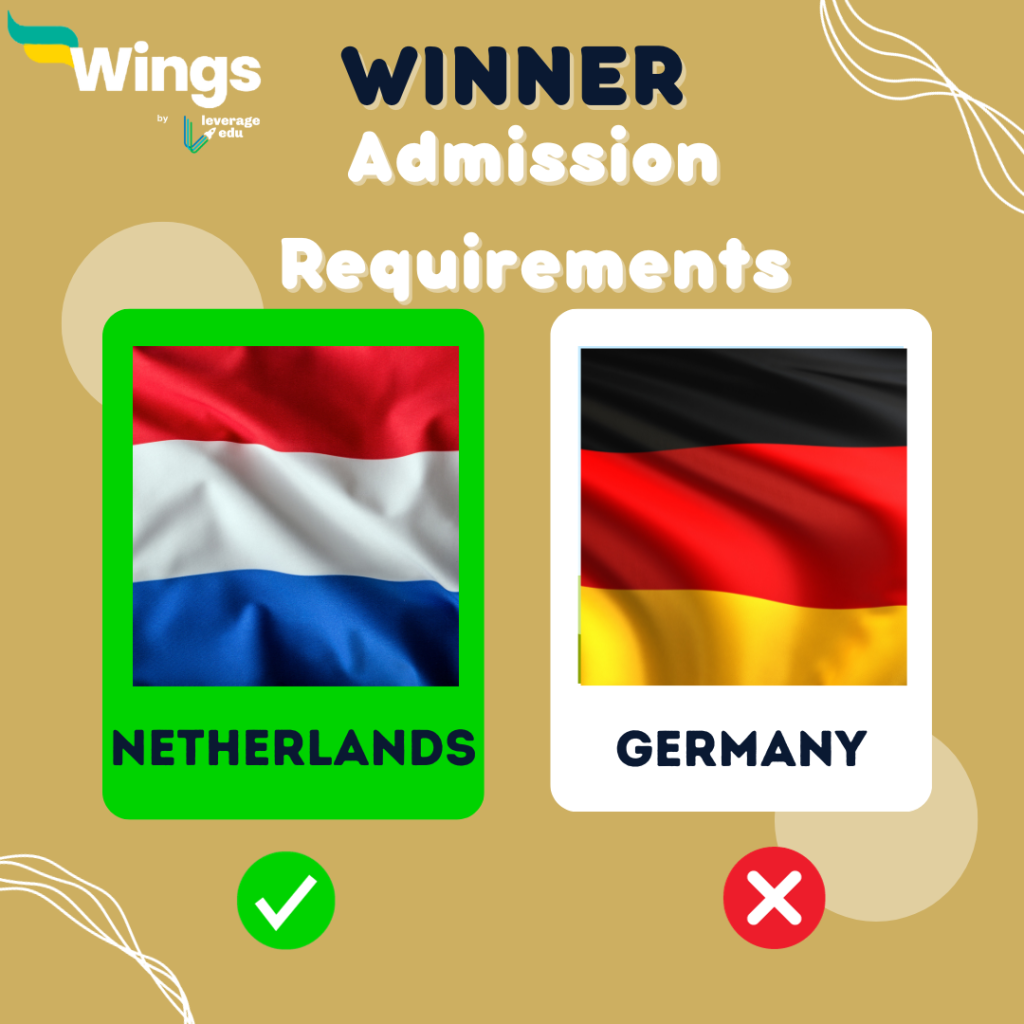
Also Read: PhD in the Netherlands
Tuition Fees
This section will determine which country has the lowest school costs. A score of +2 points will be awarded to the country with the lowest education costs. Let us now examine education fees in the Netherlands and Germany.
Tuition Fees in the Netherlands
According to the websites of the universities in the Netherlands, the average annual tuition fees in the nation are as follows:
| Study Program | Average Annual Tuition Fee |
| Undergraduate | €6,000 – €15,000 |
| Postgraduate | €8,000 – €20,000 |
| Doctoral | €6,000 – €20,000 |
Tuition Fees in Germany
According to the websites of the universities in Germany, the average yearly tuition fees in the country are as follows:
| Study Program | Average Annual Tuition Fee |
| Undergraduate | €300 |
| Postgraduate | €300 – €28,000 |
| Doctoral | €300 – €3000 |
Which Country is Better?
As we can see from the tables given above, studying in Germany is less expensive than studying in the Netherlands. Hence, Germany will receive a +2 score in this round of the Netherlands vs Germany contest.
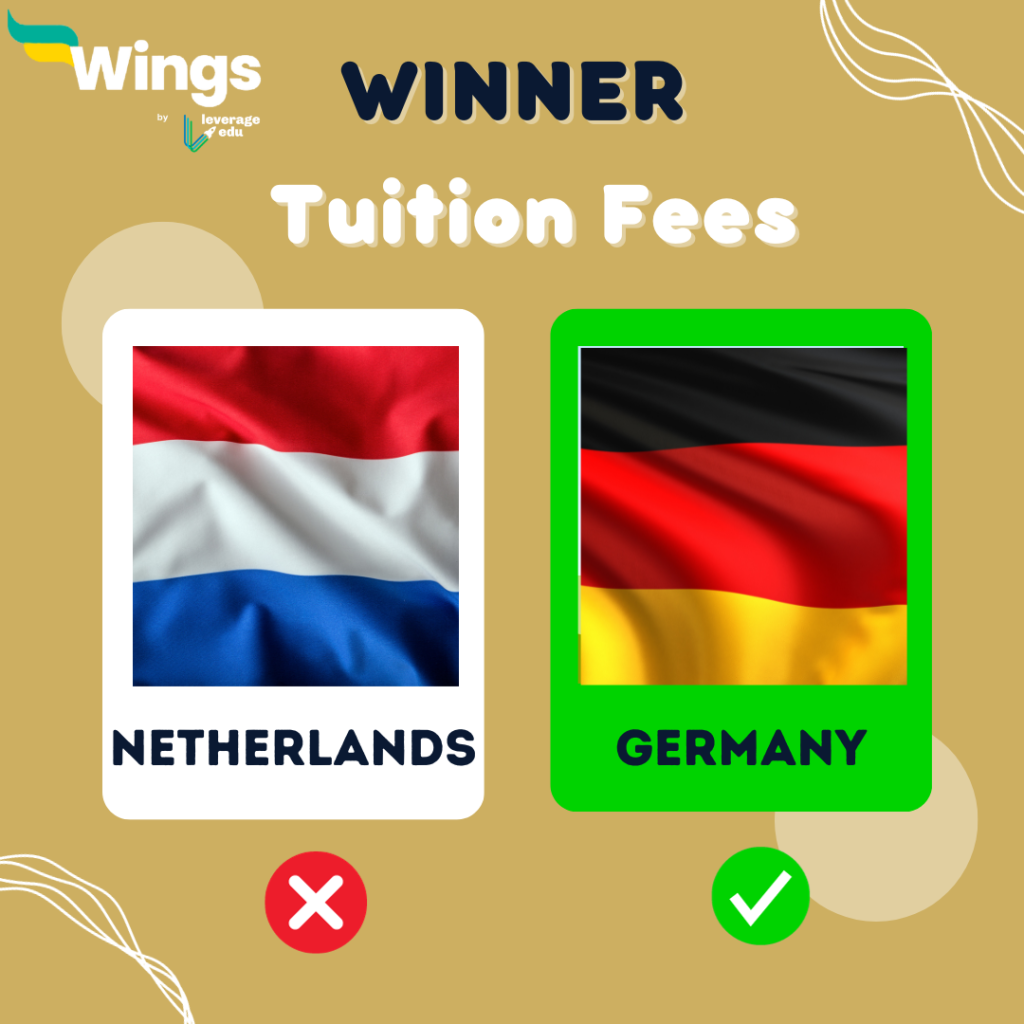
Also Read: List of MBA Scholarships in the Netherlands
Living Expenses
The cost of living is one of the key worries that international students have when deciding on a study-abroad destination. So, let’s compare the expense of living in Germany to that in the Netherlands.
Cost of Living in the Netherlands
As per the Numbeo, the cost of living in the Netherlands is as follows:
| Monthly Rent | €967.26 – €1,817.26 |
| Average Apartment Price (Price per Square Metre) | €3,669.49 – €5,044.22 |
| Average Cost of an Inexpensive Restaurant Meal | €15 |
| Average Transportation Cost (Monthly) | €80.95 |
| Average Cost of Utility (Monthly) | €277.51 |
Cost of Living in Germany
The cost of living in Germany according to Numbeo is given in the table below:
| Monthly Rent | €837.16 – €1,542.61 |
| Average Apartment Price (Price per Square Metre) | €4,673.91 – €6,446.89 |
| Average Cost of an Inexpensive Restaurant Meal | €12 |
| Average Transportation Cost (Monthly) | €63 |
| Average Cost of Utility (Monthly) | €353.68 |
Which Country is Better?
The average cost of living in Germany ($1533) is 18% less expensive than in the Netherlands ($1862). Germany ranked 29th vs 19th for the Netherlands in the list of the most expensive countries in the world. Hence, Germany will get +2 points in this section of our Netherlands vs Germany contest.
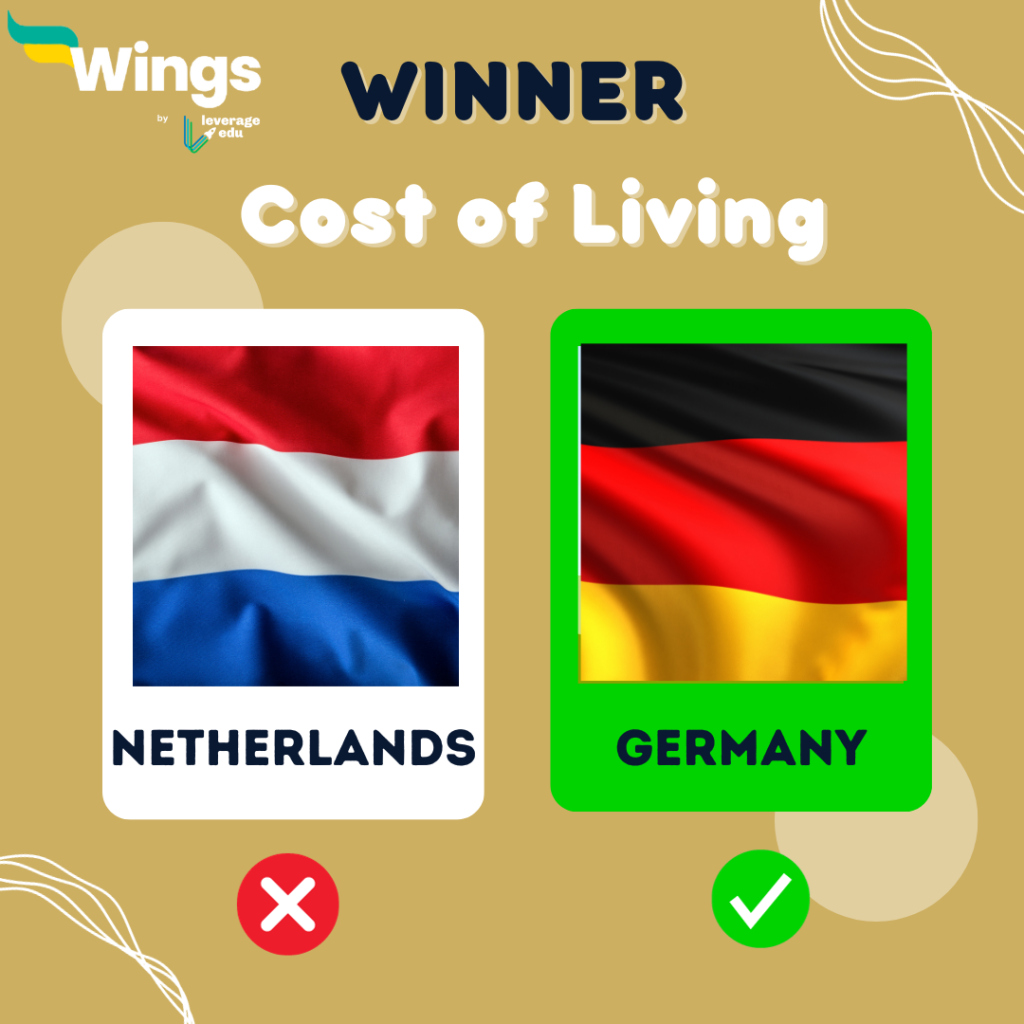
Also Read: PhD in the Netherlands
Work Permit and PR
Students often study abroad with the goal of finding work and securing permanent residency. Let us compare the ease with which a work visa and permanent residency can be obtained in the Netherlands to that of Germany.
Work Permit in the Netherlands
In the Netherlands, a work permit is issued as follows:
Eligibility Requirements for a Work Permit in the Netherlands:
- You must have a valid employment contract with a Dutch employer.
- For employees over the age of 23, you must earn at least the minimum wage.
- Your company must demonstrate that the post could not be filled by a Dutch or other EU/EEA national.
Apply for a Work Permit in the Netherlands:
You must apply for a visa in person at the Dutch mission, embassy, or consulate in your country of residence. If this is not possible, you can contact a Dutch mission in another nation. After your application is approved, the Dutch mission will attach a visa sticker to your passport. The processing time for a work permit in the Netherlands might range between 2 weeks and 90 days.
PR in the Netherlands
Non-EEA residents who have lived in the Netherlands for more than 5 years can apply for permanent status.
Work Permit in Germany
Here is how a work permit is given in Germany:
Eligibility Criteria for a Work Permit in Germany
The following are the requirements for obtaining a work permit in Germany:
- You must meet the qualifications and competences required for the position.
- It is vital to ensure that you have enough health insurance for your stay in Germany.
- A genuine work offer from a German company is required.
- Apply for a work-related residence permit through your home country’s German embassy or consulate.
- Ascertain that you have enough lodging arrangements in Germany.
- Provide your prospective employer with a signed employment contract.
Apply for a Work Permit in Germany
To work in Germany, non-EU residents must get a work visa as well as residence permission. They must make contact with the German embassy or consulate in their home country. Their application must include the following information:
- Valid passport
- Certificates of academic qualification
- Job offer letter from the firm in Germany
- Certificates of work experience
- Annexure for an employment permit
- Approval letter from the Federal Employment Agency
Work permit applications are processed in about 1-3 months.
PR in Germany
To be eligible for a German Permanent Residence Permit, you must have lived in Germany for at least five years (or three years if married to a German citizen). You must also provide proof of employment, financial means, and German language skills.
Which Country is Better?
As you can see, obtaining a work permit and permanent residency is easier in the Netherlands than in Germany. Hence, the Netherlands will receive a +2 score in this section of our Germany vs Netherlands contest.
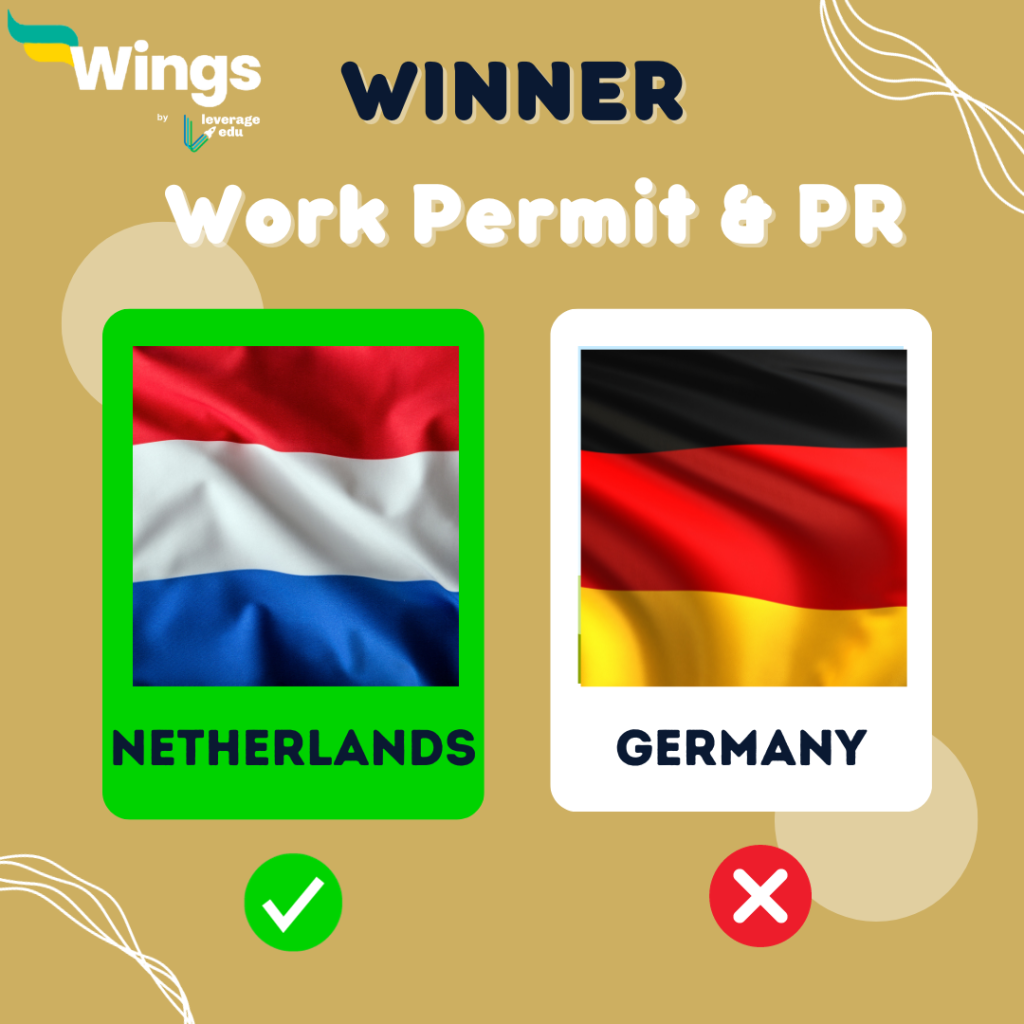
Also Read: Student Life in Germany
Average Salaries: Netherlands vs Germany
According to Expatrio, the average graduate’s starting income in Germany is €44,000 per year. A master’s degree holder, on the other hand, may expect to earn an annual gross salary of €61,906 in Germany. According to WeAreDevelopers, the average pay after graduation in the Netherlands is €46,665, whereas the average yearly wage of a postgraduate in the country is €56,87, according to Glassdoor.
Which Country is Better?
The above comparison demonstrates that the average salary in Germany is generally higher than in the Netherlands. However, salary levels can vary depending on the specific city, occupation, and individual circumstances. Therefore, Germany recieves +2 points in this round of our Netherlands vs Germany contest.
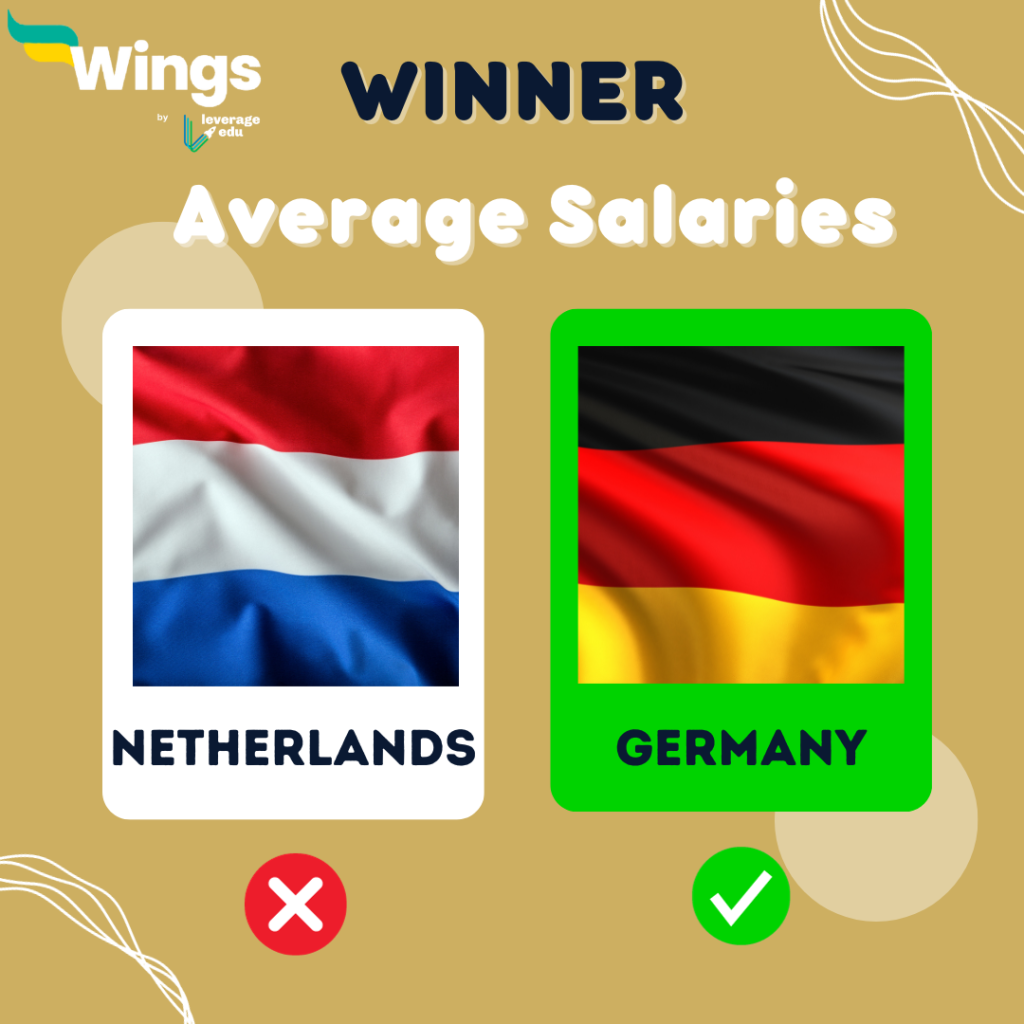
Also Read: Masters in Data Science in Germany
Other Major Elements
Let’s look at some of the other important factors to consider while picking where to study abroad. These are the crucial elements:
Climate
The maritime climate in the Netherlands is mild. This type of climate is distinguished by chilly summers and warm winters. There is no dry season in the country, and precipitation occurs throughout the year. Coming to Germany, the climate here is pleasant, with no prolonged spells of cold or hot weather. The climate in Northwestern and Coastal Germany is marine, with pleasant summers and mild gloomy winters.
Safety
The Netherlands is generally regarded as a very safe country. Crimes involving narcotics, murder, and other forms of human hostility are exceedingly uncommon in the country. Similarly, there’s no need to be concerned about the safety in Germany as it is generally very safe. Given the vast number of international students that enrol in German universities each year, you should feel confident that you will be fine without taking any additional measures in normal life situations.
Culture for International Students
The Netherlands is well-known for its openness to overseas students. The culture of the country is diverse and active. Dutch people are also known for their warmth and kindness. Germany, on the other hand, has a well-known efficient work culture that values precision, punctuality, and order. You will be able to comprehend and experience the culture directly by studying in Germany, preparing you for a global career.
Also Read: Intakes in Germany
Conclusion
When the overall scores of the Netherlands and Germany are compared, we discover that the Netherlands obtained 4 points, whereas Germany received a total score of 8. As a result, Germany won this competition against the Netherlands.
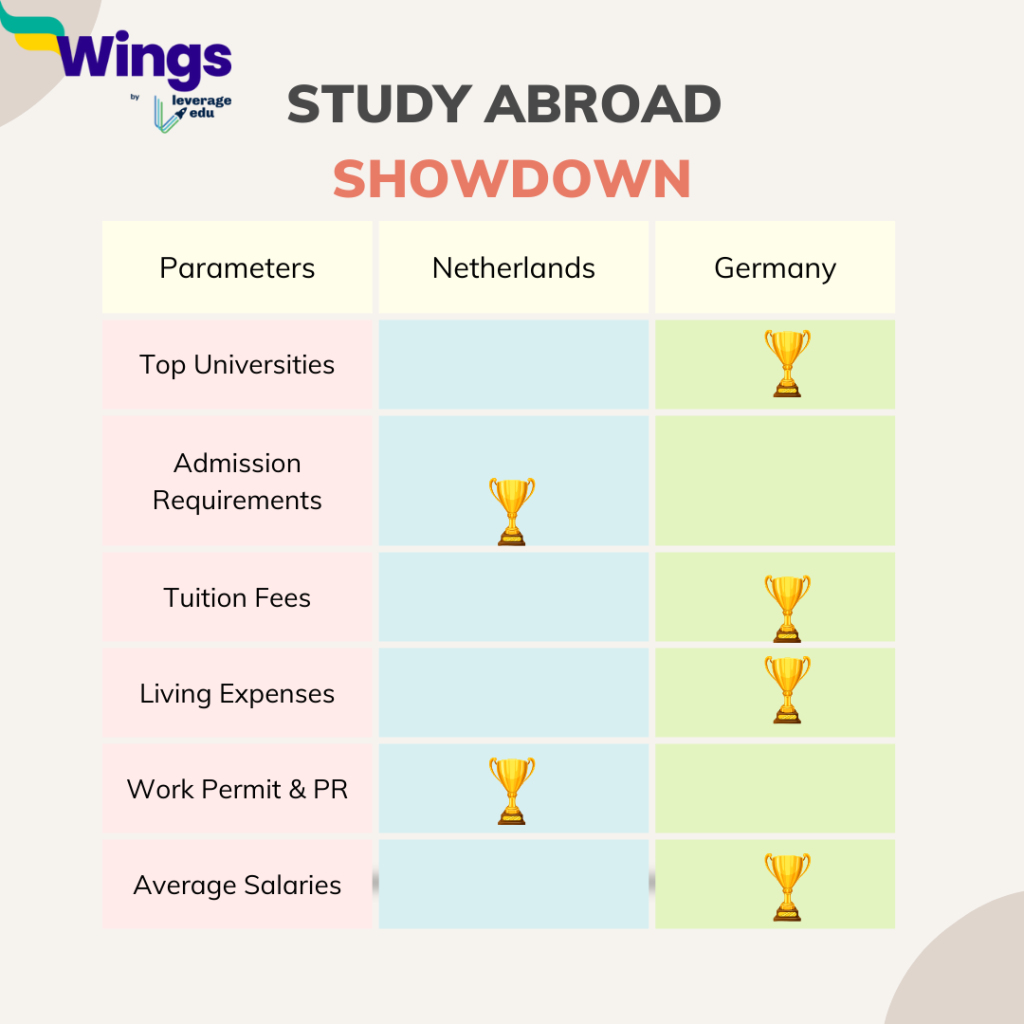
It is vital, however, to recognize that both Germany and the Netherlands have benefits and disadvantages. It is recommended that you choose a degree or field of study before applying to any country’s universities. Evaluate the educational facilities and financial aid available for your desired degree to make a better-informed decision. Nonetheless, both the Netherlands and Germany are excellent study-abroad destinations.
Also Read: How to Find Accommodation in Germany?
FAQs
Ans. If you have the financial wherewithal to study in the Netherlands, admittance to Dutch universities is easier. However, if you want a tuition-free education, a less restrictive option for working while studying, and the opportunity to meet more international students, studying in Germany is ideal.
Ans. Tuition costs and the cost of living in the Netherlands are significantly lower than in many English-speaking nations, owing to the high level of education provided by Dutch educational institutions. In addition, the Netherlands provides a variety of scholarship options.
Ans. The Netherlands is 13% more costly than Germany.
So, this was all about the Netherlands vs Germany. Many Indian students dream of pursuing education in foreign nations due to the exposure and career growth they offer. Consider joining a free counselling session with Leverage Edu if you plan to study abroad.


 One app for all your study abroad needs
One app for all your study abroad needs











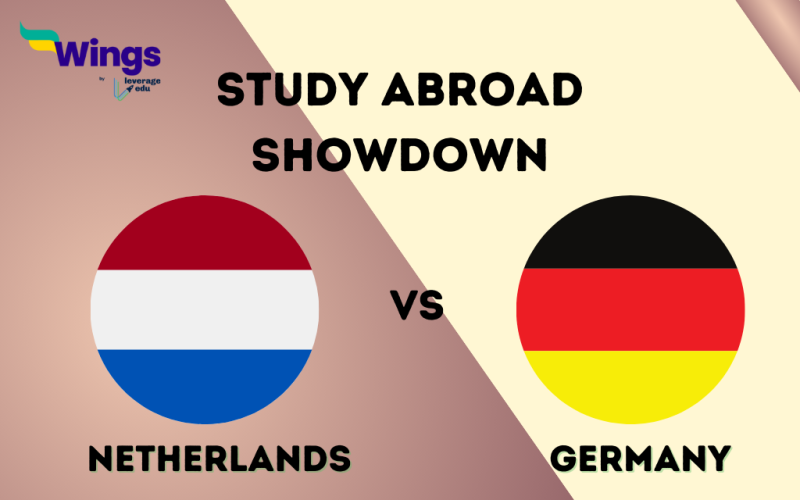
 60,000+ students trusted us with their dreams. Take the first step today!
60,000+ students trusted us with their dreams. Take the first step today!